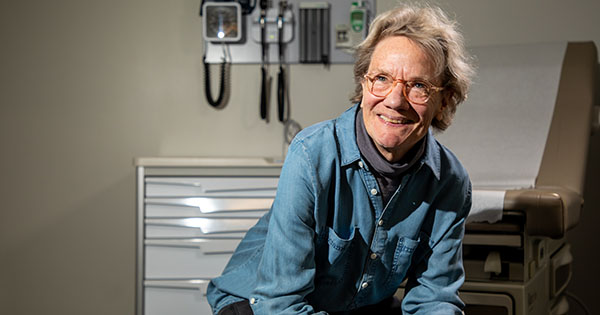Meet Christine Murdock

Expertise in “playing sick” is not a job skill that most employers would want to see on a résumé – unless you are a standardized patient.
Christine Murdock, a standardized patient (SP) at ETSU Health, has had more medical maladies than can she can count over the past three decades – but she never gets sick of being “sick.” As an SP, Murdock’s job is to portray a realistic patient, their family member or others to recreate a scenario accurately and consistently for ETSU Health students and residents.
Her work and that of ETSU’s other 72 SPs has aided in the medical education and hundreds of students and residents over the past 30 years.
What do standardized patients do? What does a typical day look like for you?
A standardized patient is basically a tool that medical/pharmacy/nursing school faculty use to teach students communication and physical exam skills. We learn a scenario written by doctors to teach the students how to explore clues to find out what the patients concerns are. The scenarios start out kind of simple: “I’m worried about this cough that won’t go away.” Then they get a little tougher – like spousal abuse, end of life discussions or dealing with a patient who was given the wrong medicine in the hospital and isn’t very happy about it, to name a few. For physical exams we’re the body so students can practice head-to-toe physicals. We have to learn the skills ourselves so we can help instruct the students. We also work with just the pharmacy students on how and why to take specific medications. We’ve also started interprofessional classes where the students work as a team with patients.
Our work schedule changes all the time! Some weeks go by with maybe a one or two hour gig and then sometimes three or four gigs, morning and afternoon — which is why it doesn’t fit in everyone’s schedule!
What is your professional background? How did you make the step from that to becoming an SP?
I was a member of The Road Company, a local theater company, when Dr. Mike Floyd, who was a fan and supporter of the company, was working with Dr. Forest Lang on developing this communications course. They were making short videos to show/explain different communication skills, when it occurred to Mike that he knew some actors and maybe they’d be good at the role-playing needed in the videos. In the beginning we would just do a couple of videos now and again. Then Dr. Lang developed the class, and I was fascinated by it all and just kept coming back for more.
What is the most rewarding part of your job?
A friend of mine was in town visiting some years ago. She didn’t quite understand this SP thing I did, and I’m not sure she quite saw its value. But then we were at the grocery store and this young man comes up to me and gives me a big hug and says he just graduated from the pharmacy school and he wanted to thank me for all the help in making that possible. Needless to say, my friend was very impressed.
What is the most challenging part of your job?
The hardest part of the job for me is learning all the medical and pharmaceutical terms. I’m sure Google thinks I'm very sick because of all the illnesses and meds I Google. But I’ve learned a lot.
 Sam Wilson West Parking Lot C...
Sam Wilson West Parking Lot C...